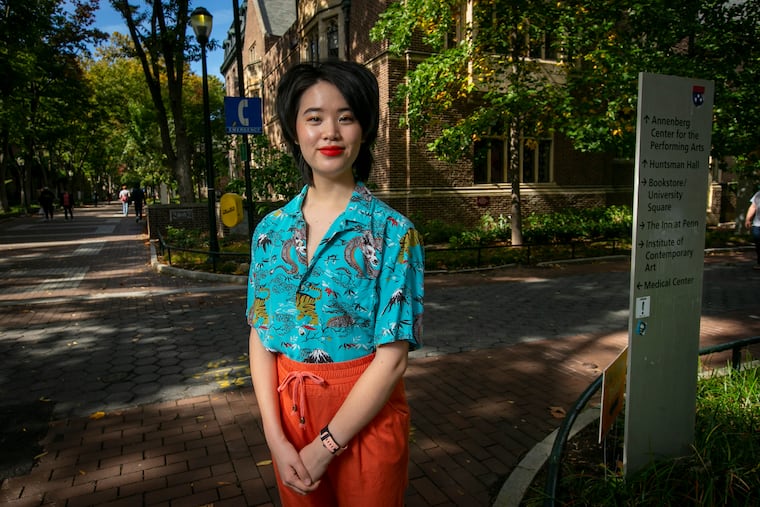Student-run Penn yearbook wants to donate some profit to Philadelphia public schools, hopes others do the same
Student, alumni and faculty groups have been ratcheting up the pressure on Penn in recent months to make payments to the city in lieu of taxes as the pandemic takes a financial toll.

For years, some students and faculty at the University of Pennsylvania have urged the school to make payments in lieu of taxes to help the city’s financially strapped public schools.
Student, alumni, and faculty groups have been ratcheting up the pressure in recent months as the coronavirus takes an even further financial toll.
Now, a student group has another idea: Donate some of its profits.
“We know anything we give can’t compare at all with the magnitude that Penn paying PILOTs [payments in lieu of taxes] would have,” said Keri Zhang, editor and chief of the student-run Penn yearbook. “Hopefully, we can make some small steps that build toward real impact.”
» READ MORE: Faculty, alumni pressure Penn to make payments to support Philly schools in push for ‘racial and economic justice’
Any donation would not come until after sales of the 2021 yearbook are complete. And the group still has to get approval for the donation from Penn. Zhang said the group isn’t sure how much it will donate but hopes it will be in the hundreds. The money would go to the Fund for the School District of Philadelphia, an independent nonprofit.
The yearbook group also hopes the gesture will spur other student groups to do the same and persuade Penn to begin making payments. Penn did not respond to a request for comment but has insisted it contributes to the city and district in other ways, including educational programming, neighborhood upgrades, services, and expertise. And the school has said that while it is largely exempt from property taxes, it contributes business, sales, and wage taxes.
“It’s our responsibility as Penn students to donate some of our profits to try to make education more accessible to Philly students,” said freshman Ahmed Laban, 17, the yearbook’s business chair, who is studying remotely from his home in Cairo, Egypt.
More than 900 Penn faculty and staff have signed a petition calling for Penn to make payments. One proposal called for the university to give the city 40% of what it would owe if it paid property taxes, estimating the tab would have been more than $36 million in 2016-17.
Last month, some Penn professors held a Zoom news conference because the university, which has nearly a $15 billion endowment and is the city’s largest private employer, refused to discuss PILOTs.
The student initiative "shows how deeply Penn faculty, staff, and students care about ensuring adequate funding for the Philadelphia public schools,” said Amy C. Offner, an associate professor of history. “Schools depend on property taxes, and when Penn does not pay its fair share, our entire city suffers.”
» READ MORE: 18,000 Philly school families still lack reliable internet; board hears of coming financial pain
That the university would continue to refuse to make payments during one of the country’s worst-ever economic periods deepens “the racial and economic inequalities that are producing historic levels of protest across the United States,” she said.
The district, which for years has struggled to pay for enough teachers, counselors, and nurses to staff its aging buildings, was forecasting a $700 million deficit in May. That has likely gotten worse, and this week the district, which operates on a $3.5 billion budget, said it had to spend $70 million on COVID-19-related expenses.
» READ MORE: Penn's new student leaders identify as first-generation college students from lower income families
Mercedes Owens, president of Penn’s Undergraduate Assembly, praised the yearbook staff for taking action.
“It’s a good initiative and a good precedent to set,” said Owens, 21, a senior from Lexington, Tenn.
She noted that student organizations have donated to Black Lives Matter and other efforts, a move the university recently began to allow as the pandemic put extraordinary pressure on nonprofits. More than 225 student organizations that receive university funding can donate to approved charities, under the new policy.
“Candidly, a process was never in place before because we have not experienced a time when student groups had excess revenue that they did not need to fund the operations of their group,” said Katie Bonner, executive director of the Office of Student Affairs.
The yearbook organization traditionally has not had much to spare. Zhang, 20, a senior from Princeton who heads the 11-member, unpaid yearbook staff, said it’s been difficult at times to sell the books and run the operation. This year, there’s the added challenge of getting photos and other yearbook material with far fewer students on campus.
Last year, the organization sold 400 yearbooks on a campus of 10,448 undergraduates. The book costs $89.99.
Staff writer Kristen A. Graham contributed to this article.